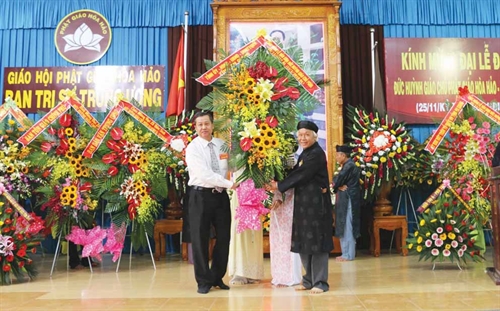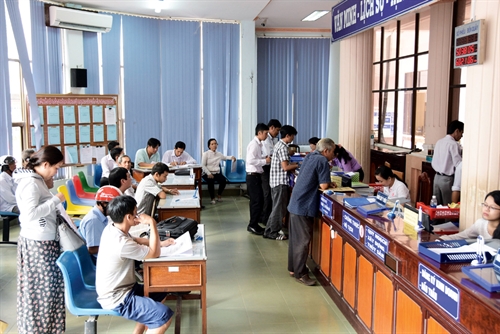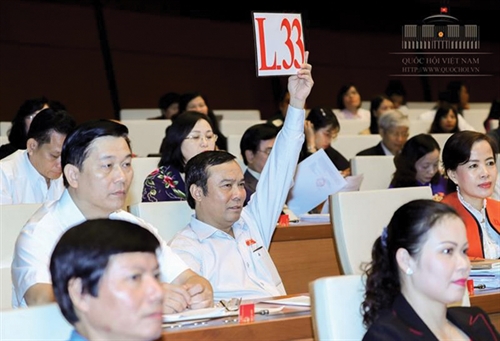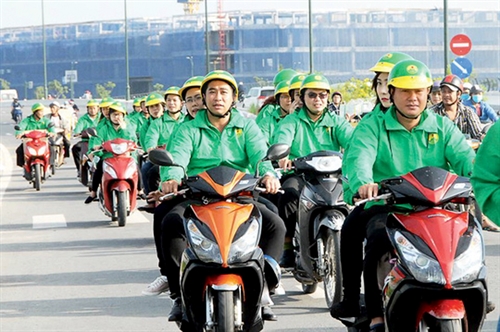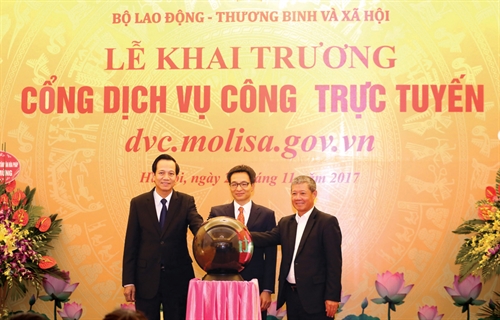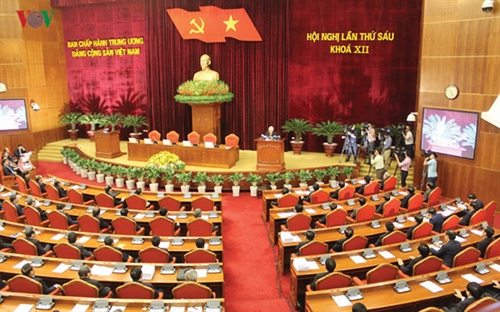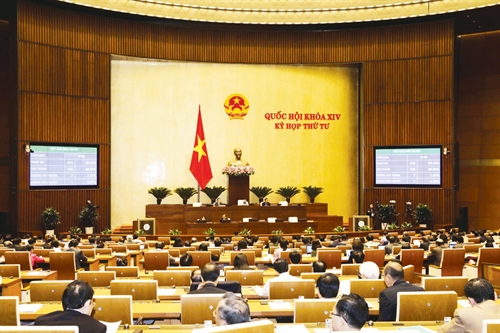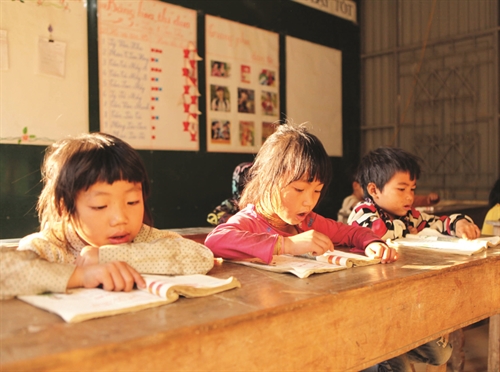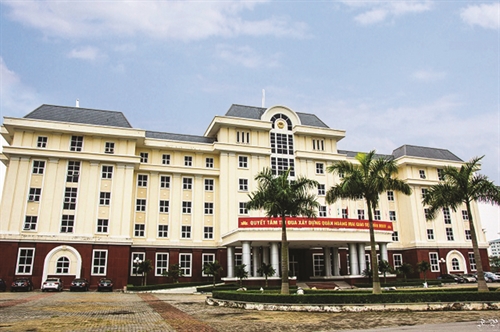Nguyen Thi Dinh, LL.M
Deputy Director
Department of Legal Affairs and Inspection,
Government Committee for Religious Affairs
On December 30, 2017, the Government issued a decree clarifying some contents of the Law on Belief and Religion, which took effect on January 1, 2018, the same day with the Law.
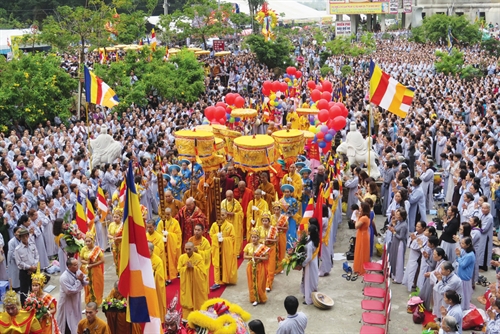 |
| Avalokitesvara Bodhisattva (Guanyin) festival in Ngu Hanh Son district, Da Nang city__Photo: Van Son/VNA |
Consisting of six chapters with 25 articles, the new regulation specifies the use of scriptures and profession of faith, registration and dissolution of religious organizations, and religious activities involving foreign elements, among other things.
Article 6.5 of the Law on Belief and Religion (the Law) provides that persons held in custody or temporary detention, prisoners and those at correctional schools and compulsory educational and drug rehabilitation centers have the right to use scriptures and profess their faith. In order to ensure security and order and conformity with practical conditions of each facility, the decree makes clear that these persons are allowed to use legally published and printed scriptures to practice their belief or religion. They can also express their faith and religious belief orally or through behavior in line with the law on temporary custody houses, temporary detention centers, prisons, correctional schools, and compulsory educational and drug rehabilitation establishments.
The use of scriptures and profession of faith, as per the decree, must neither affect the right to freedom of belief and religion and the right to freedom of non-belief and non-religion of other people nor run counter to relevant regulations.
The decree assigns the Ministry of Public Security, Ministry of National Defense and Ministry of Labor, Invalids and Social Affairs to issue instructions on scripture management and the time and place for using scriptures and showing faith for the above persons.
Article 30 of the Law provides that religious organizations are non-commercial legal entities and assigns the Government to stipulate the procedures for grant of registration of this status to dependent religious organizations. Under the Law, a religious organization may request a competent authority to grant registration of the non-commercial legal entity status to its dependent religious organizations when satisfying the following conditions: Having an organizational structure according to its charter; having property independent from other individuals and organizations and bearing liability with its own property; and participating independently in legal relations in the name of the organization.
In Article 9, the decree specifies the composition of a dossier of application for registration and the time limit for dossier processing. It says that provincial-level People’s Committees will grant registration of the non-commercial legal entity status to dependent religious organizations operating within one province and the central state management agency in charge of belief and religion will grant such registration to those operating in two or more provinces.
Regarding dissolution of religious organizations and dependent religious organizations and religious training institutions, the decree regulates the dissolution of these organizations and institutions in two cases.
In the first case, religious organizations and dependent religious organizations are dissolved according to the charters of religious organizations while religious training institutions are dissolved under decisions of religious organizations.
In the second case, religious organizations and dependent religious organizations are dissolved if they falls into either of the cases specified at Point b (failing to carry out religious activities for one year from the date such organization is recognized or its establishment, division, splitting, merger or consolidation is approved by a competent state agency; stopping religious activities for a whole year) and Point c (past the period of suspension of all religious activities, such organization still fails to remedy the cause leading to the suspension), Clause 1, Article 31 of the Law. Meanwhile, religious training institutions are dissolved if they fall into either of the cases specified at Points b and c, Clause 1, Article 42 of the Law: (i) past three years after obtaining the approval of its establishment from a competent state agency, the religious training institution fails to organize any training activities; and (ii) past the period of suspension of religious training activities, the cause leading to such suspension cannot be remedied.
For each case, the decree makes different provisions aiming to ensure the rights of religious organizations or religious training institutions concerned.
The decree requires the dissolution of a religious organization or religious training institution be published in three issues of a print newspaper or on an online newspaper at the central level or of the locality where such organization or institution’s head office is located within 15 days after its dissolution is decided. Competent authorities, religious organizations or dependent religious organizations that have the power to dissolve are responsible for publicly announcing the dissolution decisions.
Article 15 of the decree also says that the religious organization or religious training institution must stop operating on the issuance date of the dissolution decision. If being forced to dissolve in the case specified at Point b or c, Clause 1, Article 31, or at Point b or c, Clause 1, Article 42, of the Law, and disagreeing with the dissolution decision, such organization or institution is entitled to lodge a complaint in accordance with the law on complaint. Pending the settlement of such complaint, the religious organization or religious training institution is not allowed to carry out religious or religious training activities.
Article 51 of the Law provides the ordainment, appointment and election involving foreign elements in two cases: (i) a Vietnamese religious organization ordains foreigners who lawfully reside in Vietnam or elects them; and (ii) a foreign religious organization ordains Vietnamese citizens residing in Vietnam or appoints or elects them.
To seek approval for the above ordainment, appointment or election, Article 17 of the decree instructs these organizations to file a dossier of request for approval with the central state management agency in charge of belief and religion. Within 60 days after receiving a valid dossier, the central state management agency in charge of belief and religion must issue a written reply or explain its refusal.
The decree also establishes the procedures for registration to work as religious dignitaries for Vietnamese citizens who are ordained, appointed or elected abroad. These provisions aim to satisfy the need of these Vietnamese citizens when they return home to work as religious dignitaries. In this case, the religious organization that directly manages these Vietnamese should send a dossier of registration to the central state management agency in charge of belief and religion. Within 60 days after receiving a valid dossier, the central state management agency in charge of belief and religion must issue a written reply or notify the reason for its refusal.
Article 56.5 of the Law assigns the Government to stipulate in detail fundraising activities of belief organizations, religious organizations and dependent religious organizations. The decree makes clear that these organizations may raise funds on a voluntary basis from domestic organizations and individuals in accordance with law. Depending on each locality, these organizations should send a written notice of the fundraising to the concerned People’s Committee, reporting the purpose, location, method and time of fundraising, and method of management of raised funds. These fundraising activities must be adequately recorded to ensure their publicity and transparency. Abusing the name of a belief or religious organization to raise funds for self-seeking or illegal purposes is prohibited. Raised funds must be used for the proper purpose as notified, serving belief or religious and social charity activities, as per the decree.
Regarding receipt of donations from foreign organizations and individuals, Article 20 of the decree says that religious organizations that receive donations from foreign organizations and individuals for religious training activities, repair, renovation, upgrading and building of religious works, organization of religious ceremonies, publishing and import of scriptures and religious articles must comply with the Government’s regulations on management and use of non-refundable aid.
The decree also establishes the procedures for change of representatives of religious groups and religion-practicing places, change of names of religious organizations and relocation of their head offices, and the renovation, upgrading and building of belief and religious works.
In addition, the decree is attached with dozens of forms of administrative procedures in the field of belief and religion.-
